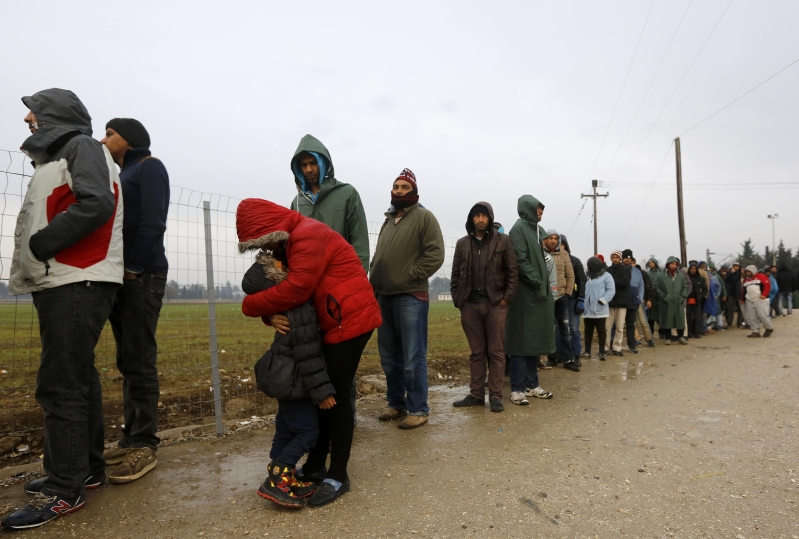
The European Union's chief executive warned on Wednesday that the survival of Europe's "partially comatose" open border travel zone and its single currency were both at risk if member nations continue erecting internal barriers to keep out refugees.
European Commission President Jean-Claude Juncker drew a direct link between the two key achievements of EU integration, telling the European Parliament the euro would be jeopardized if the Schengen passport-free travel system unravels.
"If the spirit of Schengen leaves our lands and our hearts, we will lose more than Schengen. A single currency makes no sense if Schengen falls. It is one of the keystones of European construction," Juncker said.
While there is no legal connection between the Schengen zone, which has 22 EU members and four from outside the bloc, and the 19-member euro zone, Juncker's warning reflected growing concern in Brussels that intra-EU tensions over migrants could reverse the post-World War Two war drive for European unity.
He sounded the alarm as some 1,500 migrants remained trapped in northern Greece unable to cross the border into Macedonia after Western Balkans countries overwhelmed by the refugee flow began limiting their intake to Syrians, Afghans and Iraqis.
The United Nations condemned the new restrictions with Secretary-General Ban Ki-moon saying that "profiling asylum seekers on the basis of their alleged nationality infringes the human right of all people to seek asylum, irrespective of their nationality, and to have their individual cases heard".
Tens of thousands more migrants are stranded in Macedonia, Serbia and Croatia after Schengen zone countries further north built fences to seal their borders.
New arrivals from Turkey to the Greek Aegean islands have slowed this week despite fair weather in a possible sign of more effective Turkish action to clamp down on people smugglers.
Turkish Prime Minister Ahmet Davutoglu is due in Brussels on Sunday for a summit with EU leaders meant to seal a joint action plan under which European countries will provide 3 billion euros in aid to help keep refugees in Turkey.
But days before the meeting, senior EU officials said a deal had not been finalised, with the funding, the pace at which Ankara's long-stalled EU membership talks can advance and whether Brussels can deliver on its promise of easier travel for Turks all unresolved, EU and Turkish officials said.
"MRS MERKEL, PLEASE HELP US"
German Chancellor Angela Merkel, whose country has borne the brunt of hundreds of thousands of migrants who have poured into Europe from the Middle East and Africa this year, said the open border system would only endure if EU member states accepted a permanent, mandatory quota system for sharing out refugees.
Merkel rebuffed growing pressure from her own conservatives on Tuesday to impose a limit on the number of refugees Germany would admit. It made no sense to try to curb the migration flow that way if Europe was unable to control its external borders, she said.
In the northern Greek town of Idomeni, a group of Iranian asylum seekers on hunger strike, many nearing collapse, sat in the rain on the train tracks with their shirts off.
Nearby, about 200 to 300 Algerians and Moroccans faced Macedonian border guards, chanting "Mrs Merkel, please help us!"
Mohammed Merka, a Somali prevented from crossing the Greek-Macedonian border, told Reuters: "We are human beings and we have escaped war. If they want us to go back to war let them take us back to war.
"But there is no way we are going back. We will only die. If they want us to perish here we will perish here. All our lives we have been refugees. We have never seen peace."
Greek authorities, happy to wave migrants through on their journey toward wealthy northern Europe in recent months, appear to have been caught unprepared by the decision of their northern neighbors to start filtering them by nationality.
The Schengen zone has come under immense pressure as hundreds of thousands of migrants fleeing war and poverty have streamed across the continent's largely unguarded southern maritime borders in search of security in Europe.
With Greece in particular struggling to contain the human tide, countries from Hungary and Slovenia in the south to Denmark in the north have put up temporary border controls to stem the flows, making passport-free travel harder than at any time in decades.
SITUATION "UNTENABLE"
Even Sweden, which welcomes the largest number of refugees per capita of any European nation, threw in the towel on Tuesday, saying it had no choice but to impose new restrictions.
Declaring "the situation is untenable", Prime Minister Stefan Lofven announced tighter border controls and asylum rules in a bid to reduce the number of arrivals and force other EU states to take in more refugees. Next-door Norway said it too was tightening controls.
Sweden, with a population of 9.8 million, expects up to 190,000 asylum seekers this year. Germany, with 82 million, has said it may receive up to a million migrants, about half of whom may qualify for asylum.
But there was little sign that their European partners are willing to share more of the burden.
French Prime Minister Manuel Valls told visiting European journalists that EU countries were stretched to their limits in the refugee crisis and could not take in any more new arrivals.
"We cannot accommodate any more refugees in Europe, that's not possible," Valls said according to a transcript issued by his office, adding that tighter control of external borders would determine the fate of the European Union.
"If we don't do that, the people will say: enough of Europe," Valls warned.
In a rare French criticism of Merkel, he signaled that Paris was taken by surprise by her decision to suspend asylum EU rules for Syrian refugees, saying: "It was not France that said: Come!"







